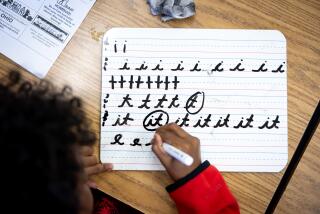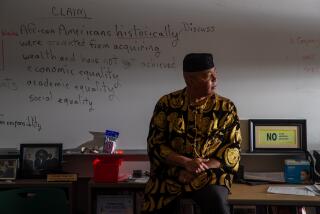Full Classes Show Latin Is Anything But Dead Tongue
- Share via
WHITTIER — Kay Burkhart began the class with a bit of Latin humor.
On the chalkboard, she had written the famous words of French philosopher Rene Descartes, cognito ergo sum (I think, therefore I am).
“Rene Descartes went into the ‘Cheers’ bar and sat down,” Burkhart said, leaning on her podium.
“Coach (the bartender) said, ‘Will you have a drink?’
“Descartes said, ‘I think not’--and disappeared.”
Get it?
Burkhart’s class didn’t.
The 17 beginning Latin students at La Serna High School looked confused. Nobody laughed. One asked whether Rene was “the little short one with curly black hair” on “Cheers,” the popular TV comedy.
“Oh, I get it,” another student said after a moment of silence. “If he couldn’t think, then he couldn’t exist, right?”
“Right,” Burkhart beamed. “I want you to go home tonight and give that joke to your folks.”
The folks might just get the joke. After all, parents pressured the Whittier Union High School District to reinstate Latin classes in 1979, a decade after the subject was dropped from the curriculum.
When classes started up again, interest in Latin was so slim that students had to be bused to one campus to take the course.
Now, Latin is flourishing, with more than 120 students studying the classical language at three of the district’s five campuses. And this year, the district produced a record 20 award winners in the National Latin Test--a prestigious addition to the resume of any ambitious college-bound student, Burkhart said.
“There is an element of elitism in Latin,” Burkhart said, “and more and more we’re seeing a concern about college SAT scores and entrance requirements.”
Parents who took Latin appreciate the influence of Latin on English and other languages, Burkhart said, and know that Latin often translates into higher scores on the vocabulary section of the Scholastic Aptitude Test and other college entrance exams.
Proper Sentence Structure
“(Latin) helped me a lot with the English part of the SAT,” said Scott Tagawa, 17, one of the district’s two gold medalists on the National Latin Test. “Latin teaches exactly what’s proper in sentence structure.”
Christine Coelho, a 15-year-old freshman, said her parents spotted Latin in La Serna’s course catalogue and insisted that she take it. Though she was unenthusiastic at first, “it’s turned out to be OK . . . not as hard as I thought it would be,” she said.
Michelle O’Shaughnessy, 17, wants to become a doctor and thought Latin would help her decipher medical terms. “The hardest part is translating English to Latin,” she said.
In addition to memorizing superlatives, imperatives and vocatives, Burkhart incorporates Roman and Greek culture into the course. Students watch movies, eat Greek and Roman food and build special projects.
The file cabinets in the back of the classroom are cluttered with some of those projects, including a model of a Roman building and a little white toga sewn for a Cabbage Patch Doll. Last year, one student built a catapult that took up nearly half the space in the front of the classroom.
“That attracted a lot of interest, but it took up too much space,” said Burkhart, who has taught in the Whittier district for 24 years. “I decided to request smaller projects this year.”
Several students mentioned the tales of Greek mythology as their favorite part of the class, and wrote their own myths as a class project.
‘Turned Ants Into People’
“I wrote about a god who turned ants into people to fill a kingdom for a king,” said Yu Sun, 16, also a gold medalist.
La Serna’s Latin students also spent part of last week preparing for their Latin banquet. In the Roman and Greek tradition, the first-year Latin students will be slaves for the second- and third-year students.
Burkhart plans to videotape the event as a tool for recruiting junior high students to the Latin program. “We have a full class of 27 freshmen signed up for next year (at La Serna),” she said.
Such a recruiting effort was unheard of in the 1960s, when Burkhart and Whittier High School Latin teacher Marina Scholl learned that the district had canceled Latin. The two teachers have watched the district’s curriculum move away from classical, then back to it.
“To me, Latin is the basis of the cultural and humanistic point of view,” said Scholl, who has taught in the Whittier district since 1960. “The kids that take Latin now are a particular breed. They become enthralled by the whole process. They feel superior. They can decipher Latin.”
More to Read
Sign up for Essential California
The most important California stories and recommendations in your inbox every morning.
You may occasionally receive promotional content from the Los Angeles Times.













